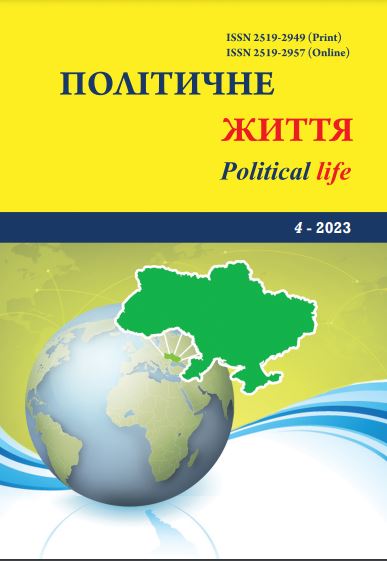Features of the state’s interaction with non-governmental organizations: the experience of Poland and the USA
DOI:
https://doi.org/10.31558/2519-2949.2023.4.7Keywords:
state; civil society; public associations; non-governmental organizations; social protection; interestsAbstract
It has been studied that in some countries, in particular in Poland and the USA, it is an equal partner alongside the public and commercial sectors, but in most countries it is not yet so and its future remains in doubt. The presence of the non-profit sector in the areas of social services, health care and education remains very insignificant. This state of affairs only emphasizes the need to work on the creation of a normal and truly functioning private non-commercial sector in Eastern Europe and in Ukraine, in particular.
It is emphasized that the potential for developing the functional efficiency of non-governmental organizations is of crucial importance for America. It has been demonstrated that non-state-organized politics and diplomacy are becoming more and more functional links in the mechanics of the practical implementation of foreign policy strategies of the American state, and are successfully used by the White House to strengthen the influence on the formation and development of civil society at various levels of the organization of world politics. Adequately to the expansion of the set of foreign policy tasks, the issue of effective provision of their successful implementation with the necessary social support (normative component) and personnel and institutional support (structural component) is solved, primarily from the standpoint of humanitarian management. By promoting the widespread development of civil society, American non-governmental organizations support an important contact mechanism in the field of global governance – especially in terms of restoring or changing priorities of national and regional development.
Four main groups of American non-governmental organizations are singled out and analyzed: 1) specific with narrow professional specialization; 2) cosmopolitan with an emphasis on the sphere of spiritual development of the individual; 3) transnational, to which transnational corporations also belong or are in close contact; 4) analytical corporations, or brain trusts. The latter play one of the key roles in US foreign policy.
It was found that non-governmental public organizations in Poland have become partners of territorial self-government on a long-term basis, at least on three levels: they perfectly fulfill the role of a kind of "communication channel" through which information "flows" from citizens to self-government and vice versa; provide direct assistance to members of the territorial community based on knowledge and experience; perform innovative functions by introducing innovations, i.e. atypical ways of solving local problems.
The main forms of cooperation between the sectors of territorial self-government and non-governmental organizations are traced. In particular: determination by the commune of the principles and procedures for obtaining grants by non-governmental organizations; participation in the development of the local development strategy; providing the non-governmental organization with the opportunity to provide certain services to the public; consultation of decisions of self-government bodies and their coordination with non-governmental organizations, in the prescribed manner and form; establishment of local law, which comprehensively establishes goals, rules, mechanisms and forms of cooperation between self-government bodies and non-governmental organizations. It is predicted that the decentralization of public finances opens up new opportunities for financing joint activities of self-government bodies and non-governmental organizations.
References
The AEI Press Publisher for the American Enterprise Institute. Books for the Trade. Fall. Winter 2000-2001. – 144 p.
Dahrendorf R. Zagrozone spoleczenstwo obywatelskie, Europa i spoleczenstwo obywatelskie – rozmowy w Castel Gandolfo. – Krakow. – 1994. – 315 s.
Lee J. Kigali R. Comparing NGO influence in EU and the US. Conference Report CASIN. Ottawa 2005. Juny. S. 4-13.
When NGOs face repression and under siege, freedom and democracy undermined, says United States. Asian Tribune-Washington D.C. 2006.12.15. Р. 1-3.
Charndhoke N. How is Global Civil Society? Journal of World-System Research. 2005. December. Р. 2.
Daveport D. The New Diplomacy. Policy Review – 2005. December / January (9–12). Р. 35.
Baylis J. B. and Smith S. (eds.). The Globalization of World Politics. Oxford and New York: Oxford University Press, second edition. 2001. 650 p.
Haas R. Think Tanks and U.S. Foreign Policy: A Policy – Makers Perspective. U.S. Department of States (www. states.gov.s/p/rem/ 15506 htm).
Aggarval V.K. Can transnational Corporations Serve as Eugene’s of Development? Berkeley APEC Study Center: Univ. of California. 2002. December 17. S. 2-4.
Пагорська І. Неурядові організації в зовнішній політиці США. Віче: теоретичний і громадсько-політичний журнал. Спецвипуск. Київ: Верховна Рада України, 2008. № 4. С. 9-11.
Національні консультативні ради. Кращі практики США. Електронний ресурс. Режим доступу: http://www.uspishnaukraina.com.ua/uk/strategy/7/66.html.
Drzewicki A. Stosunki z Ukraina w sferze bezpieczensta: polski punkt widzenia. Bezpieczenstvo narodove. 2011. № 1. S 151-168.
Горбатенко В. Джерела і методологія дослідження сучасних україно-польських відносин. Studia Рolitologiсa Ukraino-Polona. Rocznik nauk politycznych. Вип.8. Житомир-Київ-Краків: Вид.: Євенок О. О., 2018. С. 51-57.
Конституции зарубежных государств: США, Великобритания, Германия, Италия, Греция, Япония, Канада. Сост., введ., вступ. ст. В.В. Маклаков. – Москва: БЕК, 1991. 592 с.
Кокошинський О. Неурядові та громадські організації, їх роль у розвитку міжнародного співробітництва у сфері європейської та євроатлантичної інтеграції України: досвід і шляхи вдосконалення. Україна – НАТО: науковий журнал «Євроатлантикінформ». – Київ, 2009. № 2 (27). С. 54-70.
Політична система і громадянське суспільство: європейські і українські реалії: Монографія. За ред. А.І. Кудряченка. К.: НІСД, 2007. 436 с.
Корнієвський О.А., Нечипоренко В.О. Сучасні виклики громадянському суспільству України в умовах політичної нестабільності. Стратегічна панорама. Щоквартальний науково-практичний журнал. Вип. 1. Київ: НІСД, 2018. С. 61-66.

